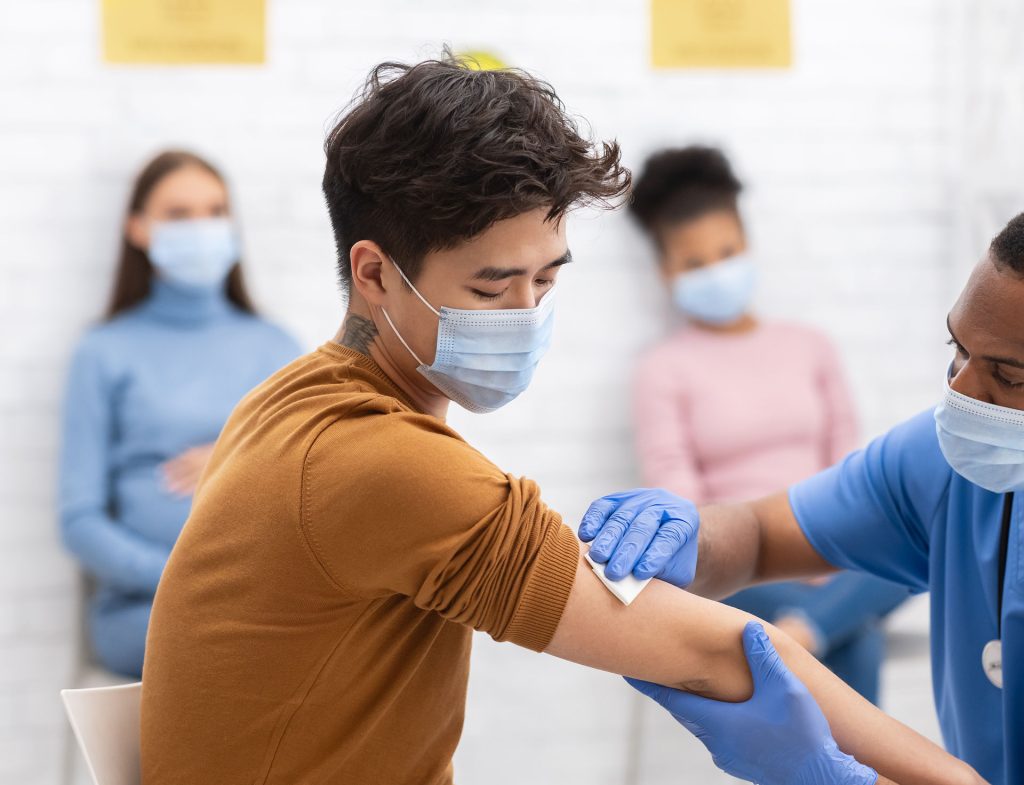Understanding Vaccines
Vaccines and Immunizations
There are many vaccines that you need to stay protected from serious diseases. Many of these diseases used to make people very sick, disabled, or caused death.
Now that we have vaccines, many of these diseases are very rare. The only way to get rid of them completely is for everyone to get the vaccines they need. It is important for babies and children to get their vaccines on time.

Important Ages for Vaccines
Review the information below to learn what vaccines you and your family
may need. Check with your family’s health care professionals to make sure
everyone is up to date on recommended vaccines. The CDC also provides
reliable information and recommendations regarding vaccines.
Baby Vaccines
Protect your baby against 14 potentially serious diseases before 2 years old with vaccines. Download the baby immunization schedule here.

Birth to 18 Months
Before your baby turns one-and-a-half years old (18 months), they need to have a series of vaccinations.
Your child will start getting these shots within the first two months after they are born. Your child needs all of the doses of these vaccines before they turn 2 years old. To be fully protected from diseases, your baby needs the following vaccines:
- 3 doses – HepB (hepatitis B)
- 3 doses – RV (rotavirus)
- 4 doses – DTAP/DT (diphtheria, tetanus, and pertussis)
- 3 doses – Hib (haemophilus influenzae)
- 4 doses – PCV13 (pneumococcal conjugate)
- 3 doses – IPV (polio)
- 1 dose – HepA (hepatitis A)
- 1 dose – Influenza (flu, every year)
- 1 dose – MMR (measles, mumps, and rubella)
- 1 dose – VZV (chickenpox/varicella)
- 3 doses – COVID-19 (coronavirus)
Childhood Vaccines
On-time vaccination throughout childhood is essential because it helps provide immunity before children are exposed to potentially life-threatening diseases. Download the childhood immunization schedule here.

2 to 3 Years
During age 2 to 3 years (24 to 36 months), your child needs to get the following vaccinations.
At 2 to 3 years of age, your child should receive vaccines to protect them from the following diseases:
- 1 dose – Influenza (flu, every year)

4 to 6 Years
During age 4 to 6 years, your child needs to get the following vaccinations.
At 4 to 6 years of age, your child should receive vaccines to protect them from the following diseases:

7 to 8 Years
During age 7 to 8 years, your child needs to get the following vaccinations.
At 7 to 8 years of age, your child should receive vaccines to protect them from the following diseases. If your child missed a vaccine, now is a good time for your child to catch up. Make an appointment for your child to get caught up if they have not yet received vaccines to protect them.
- 1 dose – Influenza (flu, every year)

9 to 10 Years
During age 9 to 10 years, your child needs to get the following vaccinations.
At 9 to 10 years of age, your child should receive vaccines to protect them from the following diseases. If your child missed a vaccine, now is a good time for your child to catch up. Make an appointment for your child to get caught up if they have not yet received vaccines to protect them.
- 1 dose – Influenza (flu, every year)
Adolescent Vaccines
Before your child turns becomes an adult, they need to have the following vaccines. If your child missed a vaccine, now is a good time for your child to catch up. Make an appointment for your child to get caught up if they have not yet received their vaccinations. Download the adolescent immunization schedule here.

11 to 12 Years
At 11 to 12 years old, your preteen should receive routinely recommended vaccines to protect them from the following diseases:

13 to 18 Years
At 13 to 18 years old, your teen needs to get the following vaccinations:
- 1 dose – Influenza (flu, every year)
- 1 dose – MenACWY (meningococcal disease). If first dose is given at age 13 to 15 years, a booster dose at age 16 to 18 years is needed. If first dose is given at or after age 16 years, no booster is needed.
- 1 dose – MenB (serogroup B meningococcal) may be given, preferably at 16 through 18 years (two doses)
Adult Vaccines
Although children get the majority of the vaccinations, adults also need to be sure they are protected from certain diseases. Download the adulthood immunization schedule here.

Adulthood (18+)
Adults need to keep their vaccinations up to date because immunity from childhood vaccines can wear off over time.
- 1 dose – Influenza (Flu Shot, every year)
- 1 dose – DTAP/DT (diphtheria, tetanus and pertussis)
- 3 to 4 doses — COVID-19 (coronavirus), if not previously vaccinated
Vaccine FAQs
Get answers to common vaccine questions.
What is a vaccine or immunization?
A vaccine is a type of medicine that is usually given to you as a shot with a needle. The medicine in the shot protects your body from one or more diseases. When you get this medicine, your body learns how to fight the disease so that you will not get sick from it. This is called “immunization.”
Is there an age restriction for vaccines?
Your doctor can determine if you should receive a vaccine based on CDC recommended guidelines.
Why does my child need vaccinations?
Vaccines help the people who get them because they prevent them from getting diseases or infections that could make them sick or even kill them. They also help the vulnerable, unvaccinated people around them because it reduces the spreading of diseases and infection if most people are vaccinated and are not contracting them in the first place.
Are vaccines safe?
Yes. Vaccines are very safe. If any side effects occur from vaccinations, they are very minor, such as soreness where you received the shot, fussiness; or a low-grade fever. Serious side effects, like allergic reactions, are very rare, and doctors are trained to treat them.
My child doesn’t like shots. Is there another way to get vaccinated?
Some vaccines can be taken by mouth or sprayed into your nose. Talk to your doctor to see whether this is an option. Most of the time, you will need to have the shot with a needle. It may sting for a moment and be a little sore, but it is much better than taking the risk of getting sick. Putting a cool, wet wash cloth where you got your shot can help make it feel better.
Why do we get the same shot more than once?
Some vaccines take more than one dose to give you full protection. Other vaccines stop working after a while, so you need to get them again. Make sure that you get every dose of all of your vaccines. This is the only way to make sure that you are protected from the disease.
Why do vaccinations start so early?
Babies and young children need to be vaccinated because they are more at risk for diseases. These diseases can also be much more serious for infants and young children.
How do I know which vaccines my child needs?
Talk to your child’s doctor about what vaccines they need. You can also look at these charts that tell you what vaccines your child needs based on how old they are.
Helpful Websites
Learn more from these trusted resources:

